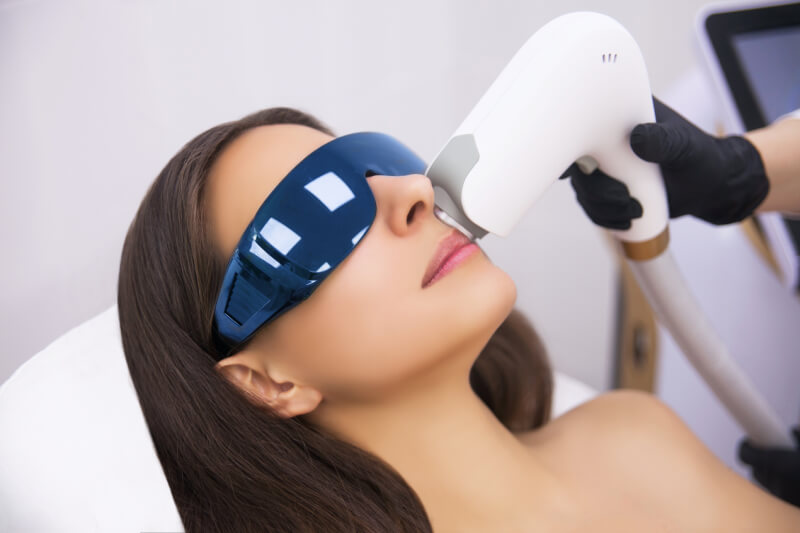Intense pulsed light (IPL) is a type of therapy used to improve the color, tone, and texture of your skin without the need for surgery. IPL uses light energy at different wavelengths to treat a wide range of skin conditions at the same time.
Conditions such as sun damage, acne scars, stretch marks, liver or age spots, fine wrinkles, rosacea, and discolored skin can be improved with IPL therapy.
This type of therapy is also sometimes referred to as a photofacial. The treatment sessions are effective, safe, and show quick results, making them a sought-after option for people who want to reduce redness, pigmentation, and signs of aging without surgery or injections.
IPL should always be performed by a trained and qualified professional.
IPL treatment sessions are designed to target the many telltale signs of aging skin. They can treat a whole host of skin conditions safely and effectively. This is because the IPL device delivers broad-spectrum pulses of light that can be adjusted to treat skin conditions, such as:
- Redness or blotchiness caused by rosacea
- Age spots, freckles, and sun spots
- Loose, sagging skin, and fine wrinkles
- Uneven skin tone and texture
- Unwanted facial hair
- Acne scarring
Other than the face, IPL can also be used on the neck, chest, back of the hands, and shoulders.
During IPL therapy, a series of short light pulses target the skin cells in the area identified for treatment. Light waves pass through the top layer of skin (epidermis) to the targeted lesion, which may be pigmented or vascular.
Here are some precautions to keep in mind before your IPL therapy session,
- Avoid sun tanning, tanning beds, and topical self-tanning products for four weeks before IPL.
- Do not have epilation (waxing), chemical peel treatment, or injectable treatments for two weeks before IPL.
- Do not use perfume, makeup, deodorant, or any products that can cause skin irritations on the day of treatment.
- Do not take aspirin or other blood thinners up to two days before IPL.
Patients taking Accutane/Isotretinoin must wait at least six months after they have stopped taking the medication before receiving treatments. Pregnant women should also wait to receive IPL after they have given birth and are no longer breastfeeding.
When coming for IPL therapy, your skin should be free of sunburns and tans. This is because the pigmentation caused by these conditions can affect the results of IPL treatment.
Although the treatment is not painful, you may experience a stinging sensation when the device is passed over your skin. A topical numbing cream can be used 30-60 minutes before the procedure to avoid discomfort.
As a first step, a treatment gel will be applied to your skin. Since the device emits a broad spectrum of intense pulsed lights, you will be given safety shields or glasses to protect your eyes.
The handheld IPL device will then be moved around the treatment area so it can deliver carefully targeted pulses of light energy to treat specific issues while boosting the overall condition of your skin.
Each IPL session lasts about 15-30 minutes, and most patients require anywhere from 3-6 treatments. IPL is most effective when performed in a series, with treatments scheduled 4 weeks apart.
IPL is an aesthetic treatment involving no incisions or injections and needing minimal recovery time. Any post-treatment redness usually clears up in a few hours, and pigmented lesions darken and flake off over the next few days.
The texture and tone of the skin will continue to improve over the next few days following treatment.
Your skin is much more sensitive to sunlight and more prone to sunburn, blistering, and hyperpigmentation after an IPL session. Please use sunscreen and avoid exposure to harmful UV radiation from the sun in the days following your treatment.
Certain cosmetic products and medications can increase your skin’s photosensitivity (decreased tolerance to sunlight), causing burns or rashes. The following can increase photosensitivity:
- Certain types of antibiotics, like tetracyclines and quinolones
- Non-steroidal anti-inflammatory drugs (NSAIDs), such as Aspirin
- Certain antifungal drugs
- Antihistamines
- Oral contraceptives
- Oral diabetes medications
- Diuretics
- Tricyclic antidepressants
- St. John’s wort
- Alpha-hydroxy acids
- Beta-hydroxy acids
- Tretinoins
- Perfumes or oils containing lavender, bitter orange, musk, or lemon verbena
- Foods such as celery, dill, lime, and parsley
Following all aftercare instructions will ensure you achieve the best results after treatment.
Dr. Timothy Greco and his trusted team are skilled at all types of facial treatments and procedures that help counter the effects of aging and reduce facial scarring.
Greco MD focuses on the face, head, and neck at their in-office, state-certified aesthetic surgical center. If you are interested in having an IPL treatment, we can help!
Get in touch today to schedule a consultation with Greco MD’s licensed medical aesthetician. For appointments, call (610) 664-8830 or check the provider’s schedule online.


